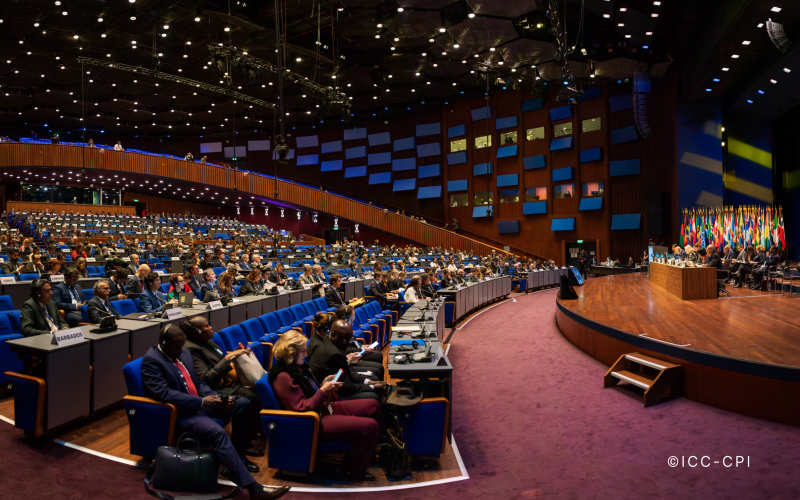The time is now, the Coalition for the ICC urges ICC States Parties to defend the Court’s independence against threats and sanctions

Civil society organisations and human rights defenders are on the front lines of efforts to ensure justice for victims of serious international crimes. A critical part of that work has always been to insist on state cooperation with the court and to defend the court and Rome Statute system from efforts to undermine them, often at great personal risk.
The Coalition for the ICC is highly concerned by the series of unprecedented threats aimed at preventing justice before the ICC. These include calls for sanctions against the Court by elected officials in Israel and the United States of America, Russian arrest warrants against the ICC prosecutor and judges, the surveillance and intimidation of ICC elected officials and human rights defenders, as well as cyber-attacks.
States Parties have come together in the past to defend the Court against interference and obstruction, and will need to do so again now. As a Coalition of hundreds of NGOs around the world, we urge States Parties and all relevant actors to ensure that the Court can continue its work, and that victims can still find hope somewhere, when there is nowhere else to turn.
Important steps have already been taken.
The Coalition welcomes the strong states party support so far, including the statement issued by 94 states parties in June declaring “unwavering support” for the ICC as an “independent and impartial judicial institution. » and “reiterate[ing] [the] commitment to uphold and defend the principles and values enshrined in the Rome Statute and to preserve its integrity from any political interference and pressure.”
The Assembly presidency has been vocal in condemning attacks on the court and its officials aimed at undermining the ICC’s mandate, making use of the Assembly’s strategy—adopted last year—to respond to threats and attacks against the court, its officials, and those cooperating with it.
We welcome the expressions of support and concern expressed in many statements to the General Debate (and in this plenary session), and the language of this year’s upcoming Omnibus resolution explicitly mentioning sanctions.
Going forward, urgent further action is needed, particularly to address potential US sanctions that could have a wide effect on the ability of the court to do its job, and also create serious risks for all those supporting the court, including states parties and civil society.
For these reasons, we offer the following recommendations:
First, words continue to matter. We urge you to keep up a strong public case for the centrality of the ICC to a global rules based order, to international peace and security, and to the rights of victims to see justice in all situations where the court acts, and to make that case directly to the US government and Congress.
Second, how you deal with your own Rome Statute obligations will matter with regard to defending the Court against the sanctions. There can be no hesitation, no selective justice, no room for ambiguity as to your obligations under the Rome Statute. The support and defence of the institution needs to be clear and unconditional. Your cooperation will only need to increase in the face of these threats.
Third, States Parties and regional institutions should advance towards the adoption or implementation of national and regional blocking statutes, such as the EU blocking statute.
Even if their impact is limited, this type of legislation remain a critical tool right now, and perhaps the only available one. Blocking statutes and similar instruments can provide the Court and its partners essential protection and send a powerful message, that the States Parties will not tolerate efforts to undermine the Court.
Fourth, States Parties should also look at other concrete measures they can take and share that knowledge within the ASP and with the court. We also call on States Parties to anticipate any coercive measure by engaging with your domestic or regional service providers to ensure that they will continue working with the Court.
Fifth, States Parties that have yet to do so, should immediately ratify the Court’s Agreement on Privileges and Immunities (APIC). To date only 79 States out of the soon to be 125 have ratified the APIC. In the past 5 years, 2 States only have ratified the APIC: Mongolia and San Marino.
Universal ratification and implementation of the APIC are key.
Finally, we are also concerned about the impact of these sanctions on those cooperating with the Court. We know too well that sanctions against the Court create apprehension and uncertainty for NGOs, consultants and lawyers who work with the ICC. These new sanctions will inevitably have an impact on victims, legal representatives and civil society. Yet, the commitment and resilience of civil society and human rights defenders for justice and victims of atrocities is as high as ever. Many human rights defenders and their families in ICC country situations themselves face pressure, intimidation, and even criminalization in efforts to silence them and stop their work on behalf of victims, and in turn, undermine the ICC’s implementation of its mandate. We ask States Parties to implement measures to protect and defend those cooperating with the Court against attacks and sanctions, and take steps to strengthen national frameworks for the protection of human rights defenders.
Every action taken by States Parties will have an impact. Time is of the essence. It is important for you, States Parties, to show that you are willing to act.
The Coalition stands ready to engage further with States Parties, the Court, other states and stakeholders to ensure that the ICC decisions are fully respected and the Court’s mandate and independence are protected.
